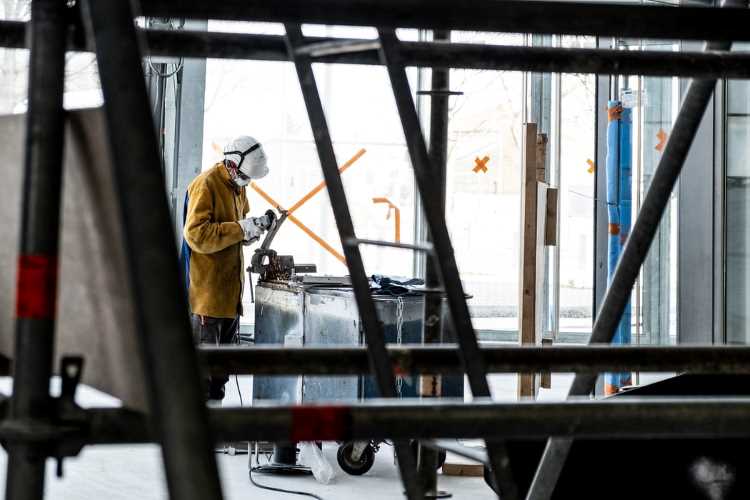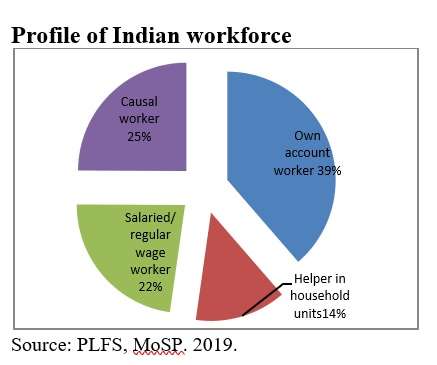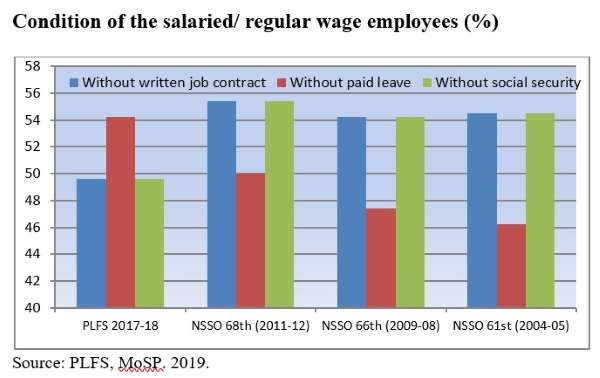
Every time a crisis befalls the Indian economy, there is an outcry for labour reforms. The votaries of easy labour laws say existing legal regime restricts the operational viability of businesses in India. The decades that followed the economic liberalisation in early 1990s saw the rolling back of several laws and regulations aimed at democratising workplaces. These laws were the result of decades of struggle by the labour movement for incorporating modern norms of social justice. The weakening of trade unions led to lax implementation of labour laws in many industries and sectors.
Indian Constitution lists labour in the concurrent list. There are 40 central laws and more than100 states legislations governing the subject. The reformists argue that this gives undue power to bureaucracy to initiate punitive action on various accounts. They say it is impossible to dismiss a formal sector employee even on performance and disciplinary grounds. The tough labour regime makes it difficult to implement business decisions such as extending working hours and reassigning of tasks, they say. Business lobbies say removal of such restrictions are necessary for attracting investment. Several state governments used to Covid-19 pandemic to suspend most labour laws.
READ I India’s migrant labour exodus and the missing trade unions
Do Indian labour laws impede the functioning of businesses? A brief review of labour laws shows this is not the case. Only a small fraction of the workforce benefits from these laws and regulations. Exploitation of labour is rampant in Indian private sector. Bonded labour is prevalent in many parts of the country, and basic benefits such as personal safety equipment, minimum salary, leaves and healthcare support are not available to a majority of Indian workforce. The argument that tough labour laws are responsible for the sorry state of the Indian economy and the industry does not cut much ice.
Ambiguity in labour laws
Indian labour laws divide the workforce into workmen and non-workman. Workman is a person who does any manual, unskilled, skilled, technical, operational and clerical work. Those who are in management, supervisory or administrative roles and drawing a salary higher than Rs 10,000 per month are considered non-workmen (Industrial Disputes Act, 1947). The labour laws protect the rights of workmen and regulate their service conditions. But in the case of non-workmen, employment contracts and organisational human resource policies are poorly defined under state-specific shops and establishments (S&E) legislations that determine the service conditions. Based on these laws, a majority of formal sector workers in private enterprises hardly receive any protection under labour laws.
Further, Indian laws do not recognise at-will employment. As per the Indian Contract Act, 1872, agreements that restrain trade, business or profession are void. This affects employment bonds, as well as non-compete and non-solicit clauses in employment contracts. In a nutshell, labour hardly receives any legal protection under Indian laws. Many investors are uncomfortable with the Trade Union Act, 1926 that permits employees to organise under trade unions.
READ I Addressing livelihood issues of fisherfolk during seasonal fishing ban
The critical provisions of some of the acts govern the protection of minimum working conditions such as provisions in the employment contracts; one-sided termination; remuneration and employee benefits such as working hours, insurance/ gratuity, holidays and leaves; health and social security benefits; safety at workplace; grievance redressal; protection from discrimination and harassment; data privacy; whistleblower protection; transfer of undertakings and status of workers, and formation of trade unions.
The labour laws envisage a modern workplace that promotes decent working conditions and dignifies labour. However, most of the provisions are applicable to the factory environment or sectors like mining, and plantation. Non-workmen in these segments do not receive most of the benefits. It means labour protection is available to blue collar workers, and white-collar employees in the public sector. While workers in the special economic/ export zones (SEZ) are technically protected by labour laws, they do not receive any protection due to the exemptions under the Special Economic Zones Act, 2005. This Act makes unionisation of workers in SEZ premises an illegal activity and bans inspection by labour commissioners in SEZ premises.
READ I Six ways how Covid-19 pandemic will change tourism industry
Coverage of labour laws
A casual look at the coverage of labour laws among Indian workers will dispel the notion that the labour norms are responsible for India’s economic backwardness. According to an estimate of the ministry of statistics and planning, the gross value addition (GVA) of enterprises in the unorganised sector in various economic production segments is between 55-65% of the GDP during 2017-18. The Periodic Labour Force Survey (PLFS) 2017-18 says that 90.7% of the workers are in informal sector and if we add the unorganised workers in the formal sector, 92% of workers in India are informal workers. The number of unorganised sector workers increased from 83% to 86.8%between 2011-12 and 2017-18.

Out of India’s nearly 500 million workforce, about 450 million are in informal sector without any protection from labour laws and regulations. Informal sector typically operates in small scale, with little or no division between labour and capital as factors of production. Labour relations is informal and complex to define as it is mostly casual employment, kinship or social relations rather than contractual arrangements with formal guarantees. A majority of the units are home-based and are part of larger supply chains without having any fixed and other assets.They cannot engage in transactions or enter into contracts with other units, nor incur liabilities on their own behalf. It is difficult to segregate family and worker and they work without any written contract.
Further, only 22% of the workers are salaried or regular wage earners in India as per PLFS 2017-18. Around 53% of the workers are self-employed and 25% are causal workers. Only the salaried category can receive some protection from labour regulations.

The Periodic Labour Force Survey shows that in most cases, the condition of those who belong to the salaried class or regular wage-earningworkers are as vulnerable as the self-employed. Almost half of the work is executed without any written job contract, paid leave or social security benefits provided under labour laws. Therefore, only half of the total regular wage/ salaried employees in India, or 11% get some protection provisioned in the labour laws which means the rest work under indecent and undignified conditions.

Commitments by government, industry associations
India is a signatory of various international labour right protection protocols and conventions. The industry is also party to various ethical practice protocols. As the founding member of International Labour Organisation, India accepts the core principles of decent work agenda that include fundamental principles of right at work, social protection and social dialogue. India has also ratified 47 out of 189 ILO conventions and one protocol, in which 39 are in force, 5 have been denounced and 4 have been abrogated. Moreover, in the 104thsession of ILO in 2015, India supported the adoption of the recommendations on the ‘Transition from Informal to Formal Economy’ that acknowledges an urgent need to address the gaps in decent work practices that prevails in the informal sector. It demands legalisation of labour rights of the informal workers, their representation in social dialogue and policy formulations. It also cautions that without the expansion of labour rights, the agenda of sustainable development in general and sustainable economic growth in particular would be jeopardised.
READ I Policy and Judiciary: A vision for post-Covid India
To attract foreign investors, India needs to standardise certain procurement to production and distribution procedures. Indian enterprises follow voluntary regulatory codes by implementing operational standards such as ISO certifications and ethical / fair trading practices. These codes also based on the decent work principles of ILO along with work place safety, environmental protection, health and social security, and other key labour rights implementations.
Since, firms in SEZs produce for global markets, provisions of SEZ Act 2005 reduce their competence in international markets. Implementation of decent work principles through enforcing labour regulations will augur well for both the workers and the entrepreneurs. Despite the entrepreneurs’ demand for relaxations in labour rights laws, they are bound to adopt certain regulatory codes and principles in each layer of production and distribution.
READ I Covid-19 explainer: All you need to know about how coronavirus is transmitted
Conclusion
During the coronavirus induced lockdowns, Uttar Pradesh, Gujarat, Madhya Pradesh, Odisha, Maharashtra, Punjab, Goa, and Himachal Pradesh decided either to suspend all labour laws or strip off some key provisions to facilitate business environment. Most of the states extended working hours to 60-72 hours, removed weekly paid leave, minimum wage provisions and removed the need for inspection of firms for three months to three years which are against the decent work principles and international fair-trade practices.
No thought has gone about the likely impact of these actions on foreign investors or India’s international trade relations. The goods produced under unregulated regimes can only cater to the domestic market. Considering the declining purchasing power of Indian consumers, these moves will end up harming the workers as well as the industries, and could upset the Union government’s ambition to make India a $10 trillion economy by 2030.
Resmi Bhaskaran is a development economist based in Manipal, Karnataka.
